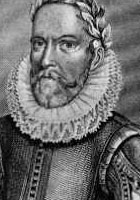Joshua Sylvester
Joshua Sylvester Poems
I pray thee, leave, love me no more,
Call home the heart you gave me!
I but in vain that saint adore
Tat can but will not save me.
...
Where I was base as is the lowly plain,
And you, my Love, as high as heaven above,
Yet should the thoughts of me your humble swain
...
WERE I as base as is the lowly plain,
And you, my Love, as high as heaven above,
Yet should the thoughts of me, your humble swain,
Ascend to heaven in honour of my love.
...
I'll ne'er believe that the Arch-Architect
With all these fires the heavenly arches decked
Only for show, and with their glistening shields
...
I weigh not Fortune's frown or smile,
I joy not much in earthly joys;
I seek not state, I reck not style,
I am not fond of fancy's toys;
...
They say that shadows of deceased ghosts
Do haunt the houses and the graves about,
Of such whose life's lamp went untimely out,
Delighting still in their forsaken hosts:
...
Were I as base as is the lowly plain,
And you, my Love, as high as heaven above,
Yet should the thoughts of me, your humble swain,
...
ALPHA and Omega, God alone:
Eloi, My God, the Holy-One;
Whose Power is Omnipotence:
Whose Wisedome is Omni-science:
...
Joshua Sylvester Biography
English poet, the son of a Kentish clothier, was born in 1563. In his tenth year he was sent to school at Southampton, where he gained a knowledge of French. After about three years at school he appears to have been put to business, and in 1591 the title-page of his Yvry states that he was in the service of the Merchant Adventurers' Company. He was for a short time a land steward, and in 1606 Prince Henry gave him a small pension as a kind of court poet. In 1613 he obtained a position as secretary to the Merchant Adventurers. He was stationed at Middelburg, in the Low Countries, where he died on the 28th of September 1618. He translated into English heroic couplets the scriptural epic of Guillaume du Bartas . His Essay of the Second Week was published in 1598; and in 1604 The Divine Weeks of the World's Birth . The ornate style of the original offered no difficulty to Sylvester, who was himself a disciple of the Euphuists and added many adornments of his own invention. The Sepmaines of Du Bartas appealed most to his English and German co-religionists, and the translation was immensely popular. It has often been suggested that Milton owed something in the conception of Paradise Lost to Sylvester's translation. His popularity ceased with the Restoration, and Dryden called his verse " abominable fustian." His works were reprinted by Dr A. B. Grosart (1880) in the " Chertsey Worthies Library.")
The Best Poem Of Joshua Sylvester
To His Coy Love
I pray thee, leave, love me no more,
Call home the heart you gave me!
I but in vain that saint adore
Tat can but will not save me.
These poor half-kisses kill me quite
Was ever man thus served?
Amidst an ocean of delight
For pleasure to be starved?
Show me no more those snowy breasts
With azure riveters branched,
Where, whilst mine eye with plenty feasts,
Yet is my thirst not stanched;
O Tantalus, thy pains ne'er tell!
By me thou art prevented:
'Tis nothing to be plagued in Hell,
But thus in Heaven tormented.
Clip me no more in those dear arms,
Nor thy life's comfort call me,
O these are but too powerful charms,
And do but more enthral me!
But see how patient I am grown
In all this coil about thee:
Come, nice thing, let thy heart alone,
I cannot live without thee!
